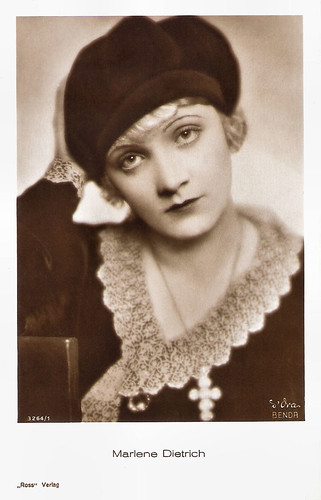
German postcard by Ross Verlag, no. 3264/1, 1928-1929. Photo: D'Ora (Dora Kallmus), Arthur Benda.

French postcard by Europe, no. 647. Photo: Mercure Film. Marlene Dietrich in Die Frau, nach der man sich sehnt/The Woman One Longs For (Kurt Bernhardt, 1929).

Austrian postcard by Iris Verlag, no. 5076. Photo: Sascha Film. Marlene Dietrich in Café Elektric/Cafe Electric (Gustav Ucicky, 1927). Collection: Marlene Pilaete.
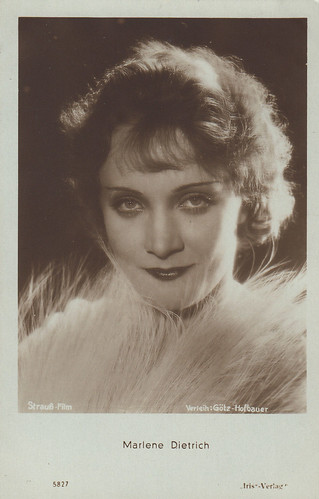
Austrian postcard by Iris-Verlag, no. 5827. Photo: Strauss-Film. Marlene Dietrich in Gefahren der Brautzeit/Nights of Love (Fred Sauer, 1929). Collection: Marlene Pilaete.
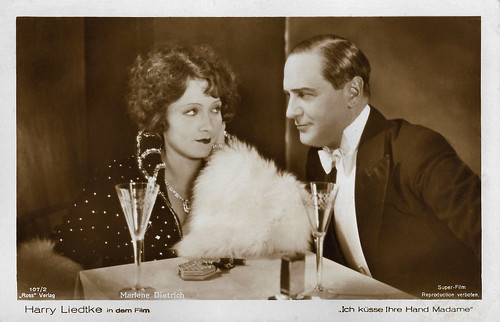
German postcard by Ross Verlag, Berlin, no. 107/2. Photo: Super-Film. Harry Liedtke and Marlene Dietrich in Ich küsse Ihre Hand Madame/I Kiss Your Hand Madame (Robert Land, 1929).
A strict, upper-middle-class Prussian home
Marie Magdalene Dietrich was born in 1901 in the then-independent municipality of Schöneberg, now part of Berlin. She was the younger of two daughters of Louis Erich Otto Dietrich and Wilhelmina Elisabeth Josephine née Felsing. Her father was a Prussian police lieutenant. Her mother was from a well-to-do Berlin family. The Felsing family was a renowned family of jewellers with a long-established jewellery shop on Unter den Linden. Felsing was the royal imperial court watchmaker.
As a child, she created her first name ‘Marlene’ from Marie Magdalene. Marlene and her elder sister, Elisabeth, were raised strictly in an upper-middle-class Prussian home. This influence would shape her acting career and her life as a citizen for years. Her father died in 1911. His best friend, Eduard von Losch, an aristocrat first lieutenant in the Grenadiers courted Wilhelmina and eventually married her in 1914. The family moved to Dessau, where Marlene was educated at the Antoinetten-Lyceum. Von Losch died of a war wound on the Eastern Front in 1918.
Marlene received violin and piano lessons from the violinist Bernhard Dessau and learned French and English. From 13 April 1917, Marlene attended the Victoria-Luisen-Schule (now the Goethe-Gymnasium) in Berlin, which she left at Easter 1918 without a school-leaving certificate. She became interested in theatre and poetry as a teenager. In 1920, she went to Weimar and initially lived in a girls' boarding school. Here she began to train as a concert violinist with Robert Reitz with whom she had an affair for a time. The skills she acquired in Weimar later enabled her to play the singing saw with virtuosity, with which she used to entertain her colleagues during breaks in filming.
Marlene Dietrich continued her studies in Berlin, but her dreams of becoming a concert violinist were cut short when she injured her wrist. She decided to become an actress. In 1921, Marlene joined a troupe of girls and toured Germany's variety theatres with them, singing and dancing. Her first stage experiences did not satisfy her. She wrote in her memoirs 'Ich bin, Gott sei Dank, Berlinerin' (1997): ‘The theatre was the only place where you could recite beautiful texts and beautiful verses like those of Rilke, which broke my heart and at the same time gave me courage again.’
After an audition at the Deutsches Theater (Max Reinhardt's German Theatre), she was given her first theatre role at the Großes Schauspielhaus in 1922 in William Shakespeare's play 'The Taming of the Shrew', which Iwan Schmith, as director, had adapted from Max Reinhardt's production. She took private lessons with members of the Max Reinhardt ensemble and was trained in rhythmic movement and gymnastics, fencing and voice training. From September 1922 to April 1923, she played - mostly as an extra - in 92 theatre performances.
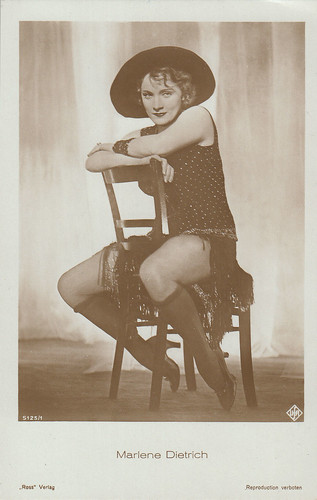
German postcard by Ross Verlag, no. 5125/1, 1930-1931. Photo: Ufa. Marlene Dietrich in Der blaue Engel/The Blue Angel (Josef von Sternberg, 1930). Collection: Marlene Pilaete.
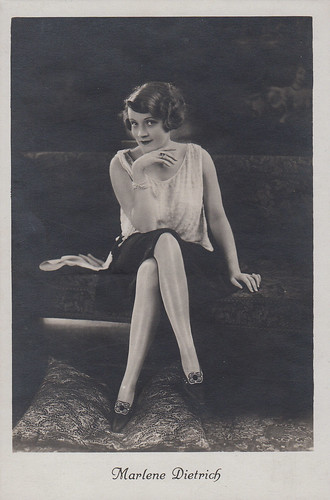
German postcard by H.C. Stöckel, Hannover-Linden for Bemberg socks. Caption: "I only wear Bemberg socks. Marlene Dietrich". Collection: Marlene Pilaete.
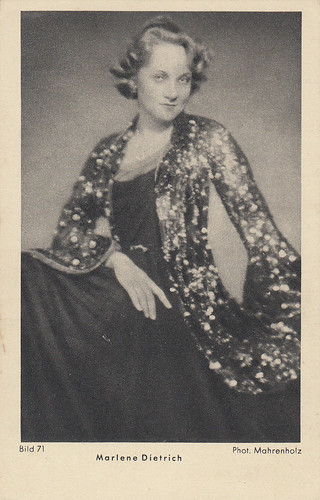
German postcard by Eidelsan, Serie 1, Bild 71. Photo: Mahrenholz. Collection: Marlene Pilaete.

British postcard in the Famous Cinema Star Series by Beagles Postcards, no. 79 N. Collection: Marlène Pilaete.

Dutch postcard by JSA, no. 230. Photo: Frhr. W. von Gudenberg. Collection: Marlene Pilaete.

Borg Cigarette card in the Film-u. Bühnen-Lieblinge series, Serie B, Bild 86. Photo: Freiherr Wolff von Gudenberg. Collection: Marlene Pilaete.
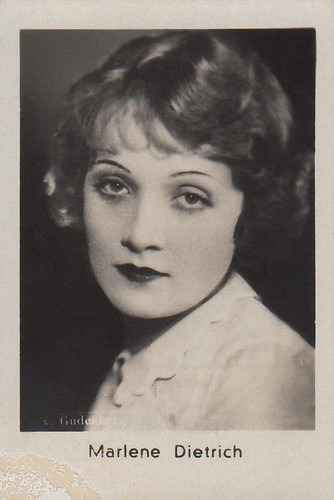
Borg Cigarette card in the Film-u. Bühnen-Lieblinge series, Serie B, Bild 89. Photo: Freiherr Wolff von Gudenberg. Collection: Marlene Pilaete.
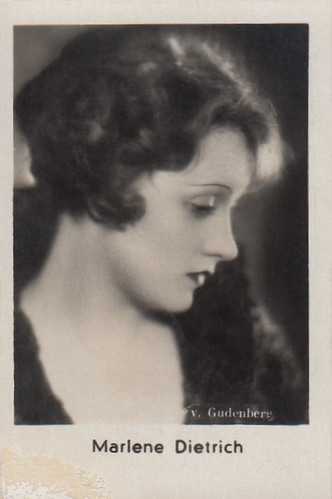
Borg Cigarette card in the Film-u. Bühnen-Lieblinge series, Serie B, Bild 112. Photo: Freiherr Wolff von Gudenberg. Collection: Marlene Pilaete.
The woman one longs for
Her uncle Willi Felsing put Marlene Dietrich in touch with a film director who invited her to do a screen test. Soon she made her film debut as a maid in the silent German production So sind die Männer/The Little Napoleon (Georg Jacoby, 1922). She later described herself in the film as ‘a potato with hair’. In the four-part silent film drama Tragödie der Liebe/The Tragedy of Love (Joe May, 1923), she played a courtroom visitor heavily flirting with the prosecutor. She became known to a wider public. On the set of Tragödie der Liebe/The Tragedy of Love, she met production assistant Rudolf ‘Rudi’ Sieber. They married in 1923. Their only child, daughter Maria Elisabeth Sieber, later billed as actress Maria Riva, was born in 1924. Dietrich and Sieber separated in the 1930s but remained married until his death. Throughout the 1920s Marlene continued to work on stage and in films in Berlin and Vienna. She attracted the most attention in stage musicals and revues, such as 'Broadway' and 'Es liegt in der Luft' (It's in the Air). After medium to large stage roles and supporting roles in films, Marlene was also entrusted with leading roles in film projects.
Dietrich played leading roles in Café Elektric/Cafe Electric (Gustav Ucicky, 1927) with Willi Forst for the Viennese film producer Sascha Kolowrat-Krakowsky, Ich küsse Ihre Hand, Madame/I Kiss Your Hand Madame (Robert Land, 1929) with Harry Liedtke, and Die Frau, nach der man sich sehnt/The Woman One Longs For (Kurt/Curtis Bernhardt, 1929) opposite Fritz Kortner. In later years, she often disavowed her early roles and downgraded her German stage and film work to mere extras. ‘Don't ask me about the twenties. I was nothing at all in the twenties,’ said Dietrich in an interview with Maximilian Schell in Die Zeit (25 March 1983). However, she participated in no less than 18 silent films.
In 1929 Marlene Dietrich made her first sound film, the Ufa production Der blaue Engel/The Blue Angel (Josef von Sternberg, 1930). The film was based on the novel 'Professor Unrat' by Heinrich Mann. Ufa film producer Erich Pommer hired the Austrian-American director Josef von Sternberg for the production. Filming took place in the Ufa studios in Neubabelsberg, today's Studio Babelsberg in Potsdam. After Melodie des HerzensMelody of the Heart (Hanns Schwarz, 1929) with Willy Fritsch, it was to be the second German sound film. Separate German and English versions of the film would be shot simultaneously. Von Sternberg was looking for a suitable leading actress for his film adaptation. Screenwriter Karl Vollmoeller attended him on Dietrich, who was appearing in the Spoliansky-Kaiser revue 'Zwei Krawatten' at the time. As von Sternberg remained sceptical after seeing the revue, Vollmoeller arranged a screen test for Dietrich.
Dietrich's screen test has survived. In it, she pretends to upbraid her pianist, Friedrich Hollaender, the film's composer. She then sings the chorus of 'You're the Cream In My Coffee', after which she climbs on the piano, hitches up her skirt to show her legs and sings, in German, a torch song called 'Why Cry' by Peter Kreuder, a well-known song-writer who became the film's orchestrator. As the test ends, Dietrich breaks character and apologizes to Hollaender. The test convinced von Sternberg. He decided in favour of Dietrich and against Pommer's favourite Lucie Mannheim or better-known actresses like Brigitte Helm.
Marlene played the ‘femme fatale’ Lola-Lola, a cabaret singer who caused the downfall of Immanuel Rath (Emil Jannings), a hitherto respected schoolmaster. Von Sternberg's romantic infatuation with his new star created difficulties on and off the set. Jannings strenuously objected to von Sternberg's lavish attention to Dietrich's performance, at the elder actor's expense. Lola-Lola was her breakthrough role. Der blaue Engel/The Blue Angel also introduced her signature song 'Ich bin von Kopf bis Fuß auf Liebe eingestellt' (Falling in Love Again). Both the film and the song became worldwide hits and Dietrich became an international star overnight. On the day of the premiere of Der blaue Engel, Marlene Dietrich signed a contract with Paramount and left Berlin for Hollywood.
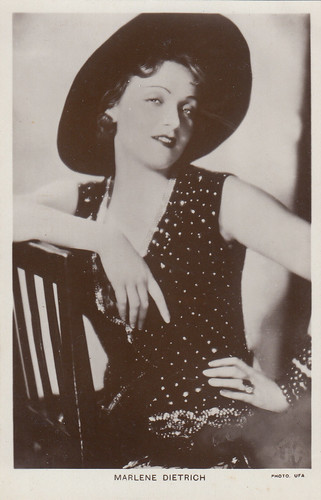
British postcard in the Picturegoer series. Photo: Ufa. Marlene Dietrich in Der blaue Engel/The Blue Angel (Josef von Sternberg, 1930). Collection: Marlene Pilaete.

German collector card by Ross Verlag in the series 'Vom Werden deutscher Filmkunst - Der Tonfilm', album no. 11, picture no. 9, group 45. Photo: Ufa. Marlene Dietrich and Rosa Valetti (middle) in Der blaue Engel/The Blue Angel (Josef von Sternberg, 1930). Caption: Marlene Dietrich as classy chansonette Lola in the 'Blue Angel'.

German collector card. Photo: Super film. Hans Albers and Marlene Dietrich in Der blaue Engel/The Blue Angel (Josef von Sternberg, 1930).
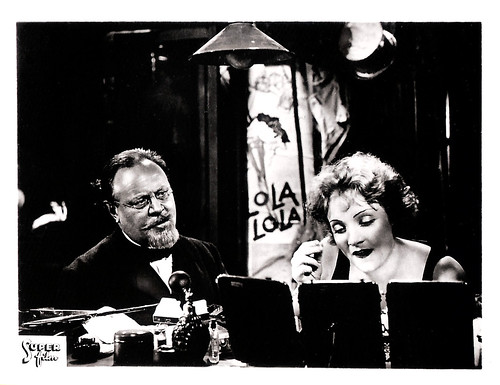
German collector card. Photo: Super film. Emil Jannings and Marlene Dietrich in Der blaue Engel/The Blue Angel (Josef von Sternberg, 1930).

German collectors card. Photo: Super film. Emil Jannings and Marlene Dietrich in Der blaue Engel/The Blue Angel (Josef von Sternberg, 1930).
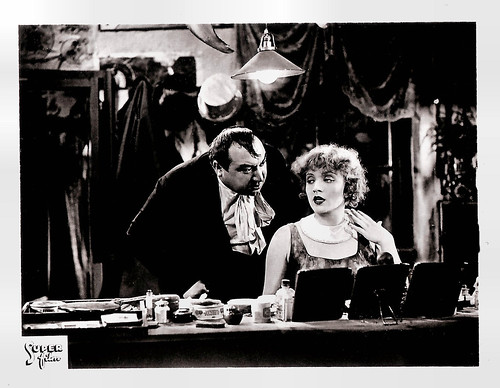
German collector card. Photo: Super film. Kurt Gerron and Marlene Dietrich in Der blaue Engel/The Blue Angel (Josef von Sternberg, 1930).

German collector card. Photo: Super film. Publicity still for Der blaue Engel/The Blue Angel (Josef von Sternberg, 1930).

German postcard by Film und Fotografie, no. A 85. Photo: Sammlung Eickemeyer, Berlin. Emil Jannings, Hans Albers and Marlene Dietrich in Der blaue Engel/The Blue Angel (Josef von Sternberg, 1930).

German postcard by Ross Verlag, no. 5965/1, 1930-1931. Photo: Paramount. Marlene Dietrich and daughter Maria.
Sources: Il Cinema Ritrovato 2024Il Cinema Ritrovato 2024, Filmportal, Wikipedia (English and German) and IMDb.
No comments:
Post a Comment